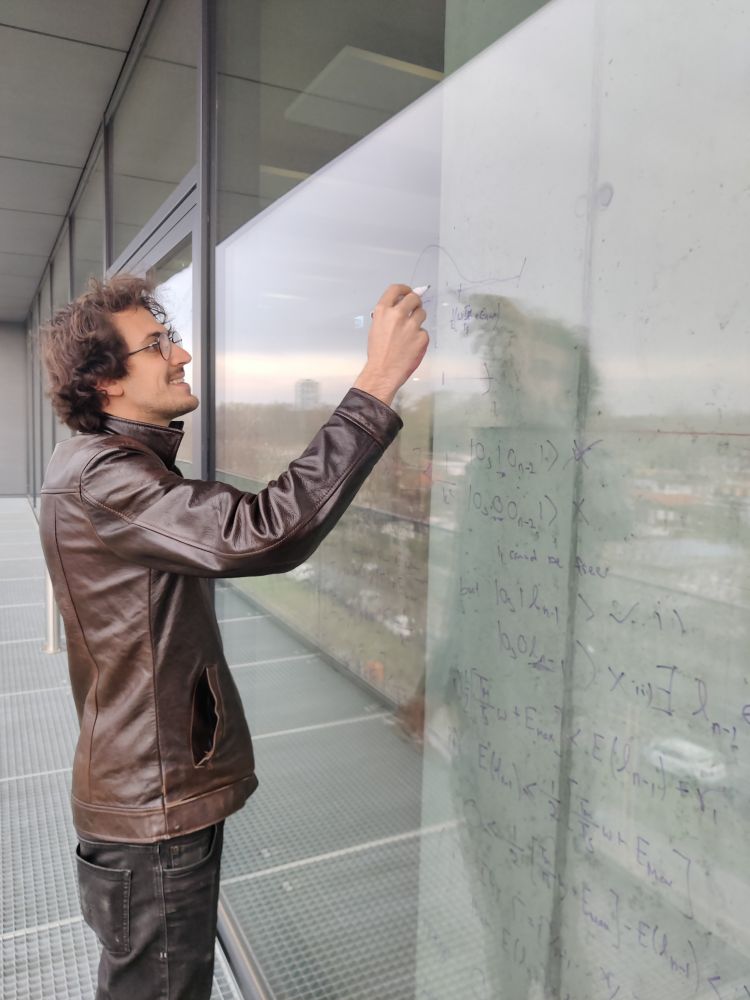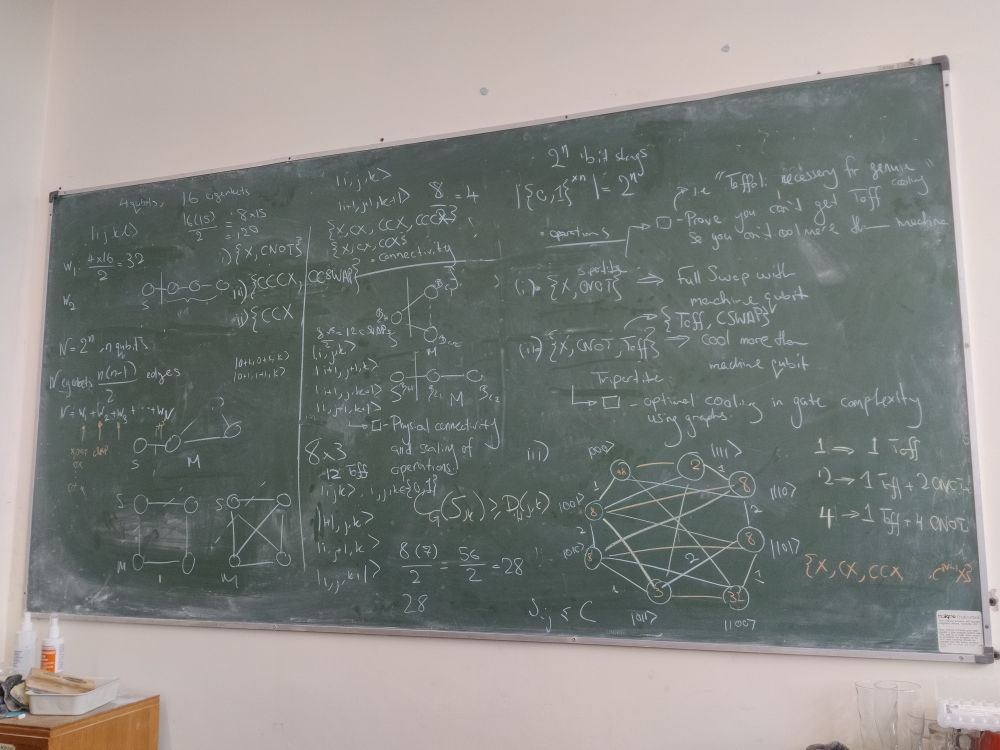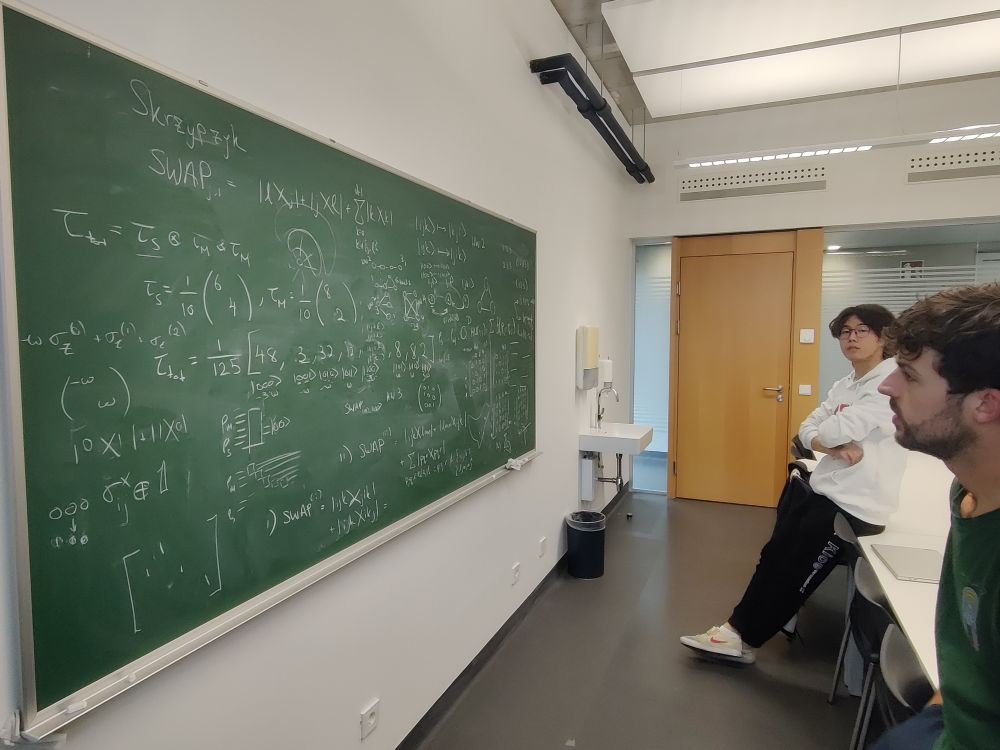"You're a cargo cult scientist,
A real crank turning nihilist,
I only found your citations--
On Google Squalor"
Avidly preparing for my next academic rap battle, that's how tenure works right?
02.08.2025 08:22 — 👍 2 🔁 0 💬 0 📌 0
Really cool, nice to see the use of dirty qubits
01.08.2025 08:09 — 👍 0 🔁 0 💬 0 📌 0
(3/3) The "quantumness" of thermal machines is an actively debated topic - showing that this "t" value is related to the quantumness of the heat exchange seems like an exciting challenge.
A computational TUR might lurk here...
29.07.2025 06:37 — 👍 0 🔁 0 💬 0 📌 0
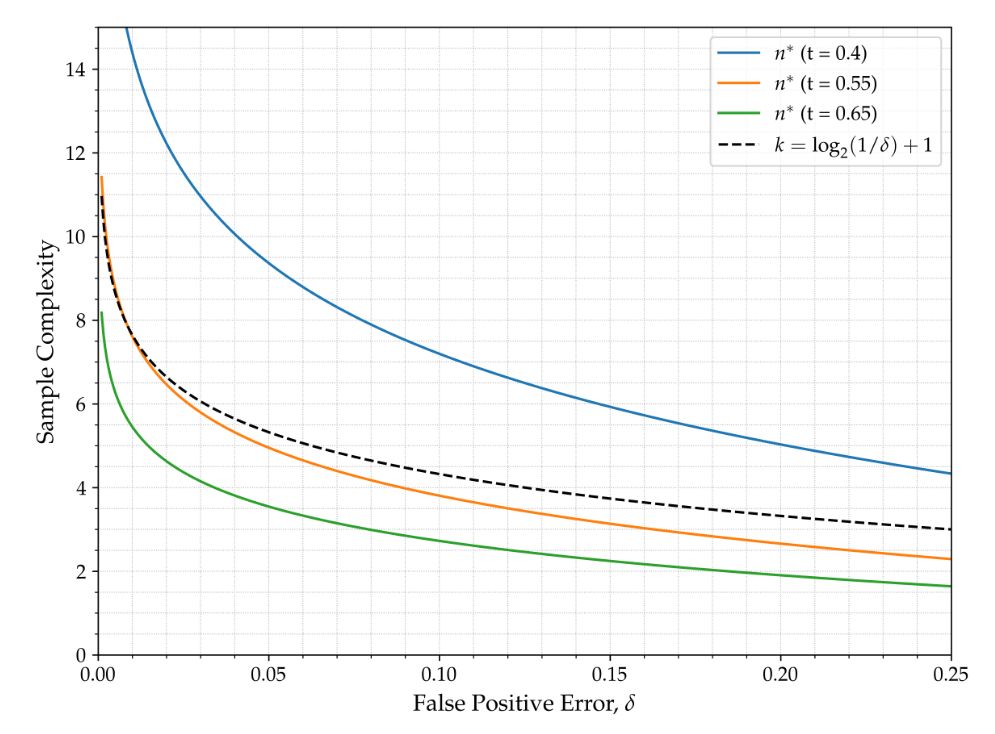
(2/3) Interestingly, it seems one can only beat the classical probabilistic sample complexity if the the two scenarios lead to probe ground state populations that are different enough. We call this "t" the distinguishability parameter in the manuscript.
29.07.2025 06:37 — 👍 0 🔁 0 💬 1 📌 0
(1/3) Updated on the arXiv this morning! No more painful typos and new appendices. One comparing our sample complexity with that of classical probabilistic approaches and another providing a recipe for oracles to prepare thermal machines.
arxiv.org/abs/2505.15887
29.07.2025 06:37 — 👍 5 🔁 1 💬 1 📌 0

View of the Maltese Archipelago from Gozo this morning 🇲🇹
12.07.2025 07:07 — 👍 10 🔁 0 💬 0 📌 0
YouTube video by CrystalRoseCreations
Mitchell and Webb: "Are we the baddies?"
Reminiscent of
youtu.be/ToKcmnrE5oY?...
22.06.2025 17:28 — 👍 0 🔁 0 💬 0 📌 0
Easy to feel powerless in times like these.
Trying to remember that science is a political act and a force that brings people together from all over the world out of excitement for the beauty of nature.
In this sense, science is an act of defiance against those that wish to divide humanity.
22.06.2025 14:31 — 👍 5 🔁 0 💬 0 📌 0
This goes hard.
19.06.2025 23:14 — 👍 1 🔁 0 💬 0 📌 0

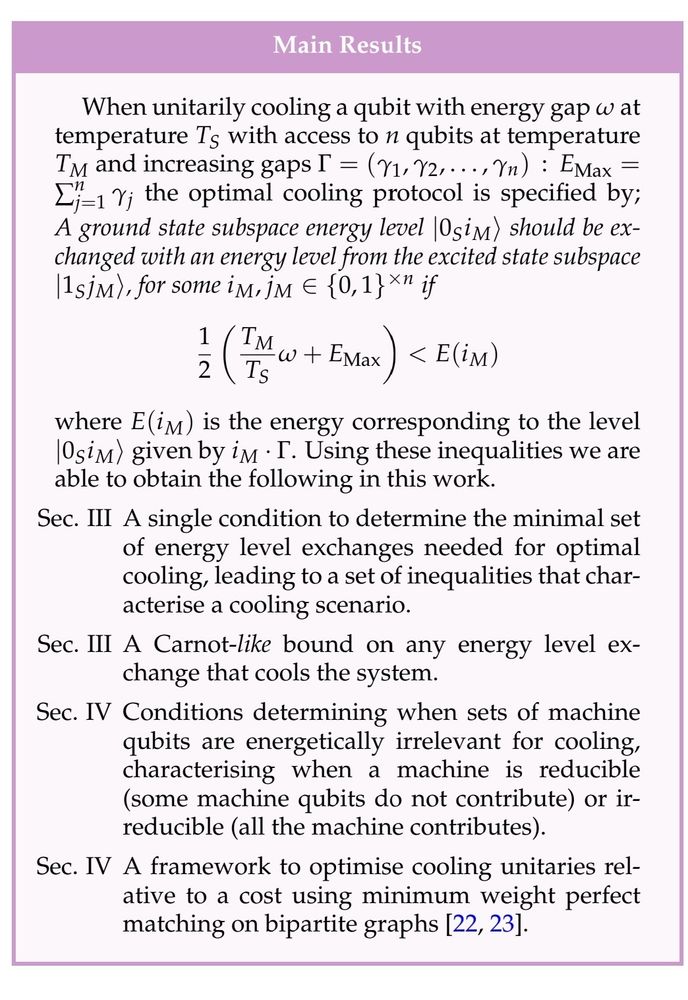
(6/n) We continue to do a whole host of things, like prove a Carnot like limit on how much you can cool per step of a protocol
But our last contribution is a method to optimise cooling unitaries by showing they can be reduced to perfect matchings on bipartite graphs.
13.06.2025 06:27 — 👍 1 🔁 0 💬 1 📌 0
(5/n) While machines with fixed energy gaps in their qubits - as those traditionally considered in algorithmic cooling, are never reducible!
13.06.2025 06:27 — 👍 1 🔁 0 💬 1 📌 0
(4/n) In particular we're able to derive a condition which allows one to energetically design useful cooling machines which are never reducible as n increases.
Here we show that machines whose energies grow exponentially in the no. of qubits are always reducible to a single qubit 😬
13.06.2025 06:27 — 👍 1 🔁 0 💬 1 📌 0
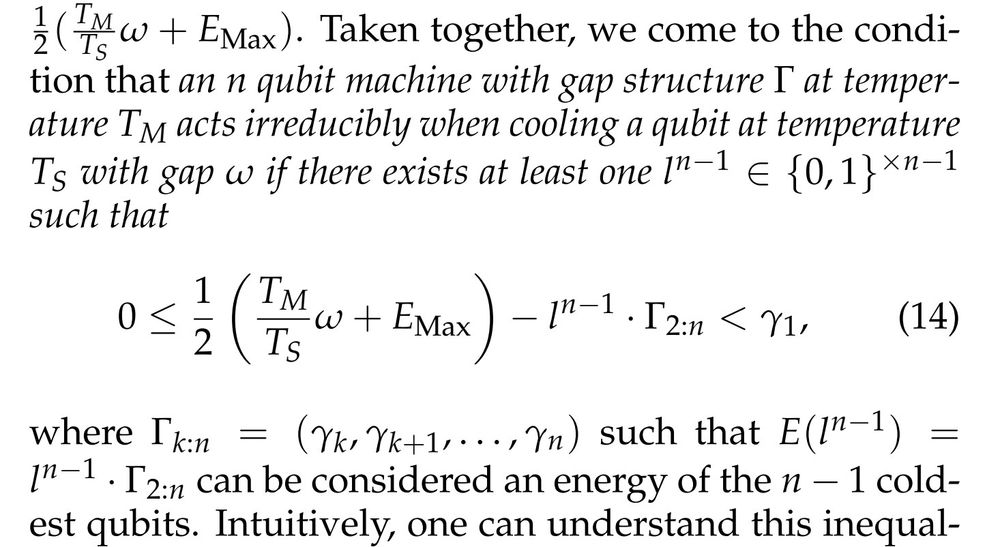
(3/n) We term this, k-reducibility, when a cooling scenario involving an n qubit machine can be reducd to one on n-k qubits -- meaning k of your qubits were useless!
This is fully characterised by our inequalities which show that it's the energetic structure of machines which underpins reducibility
13.06.2025 06:27 — 👍 1 🔁 0 💬 1 📌 0
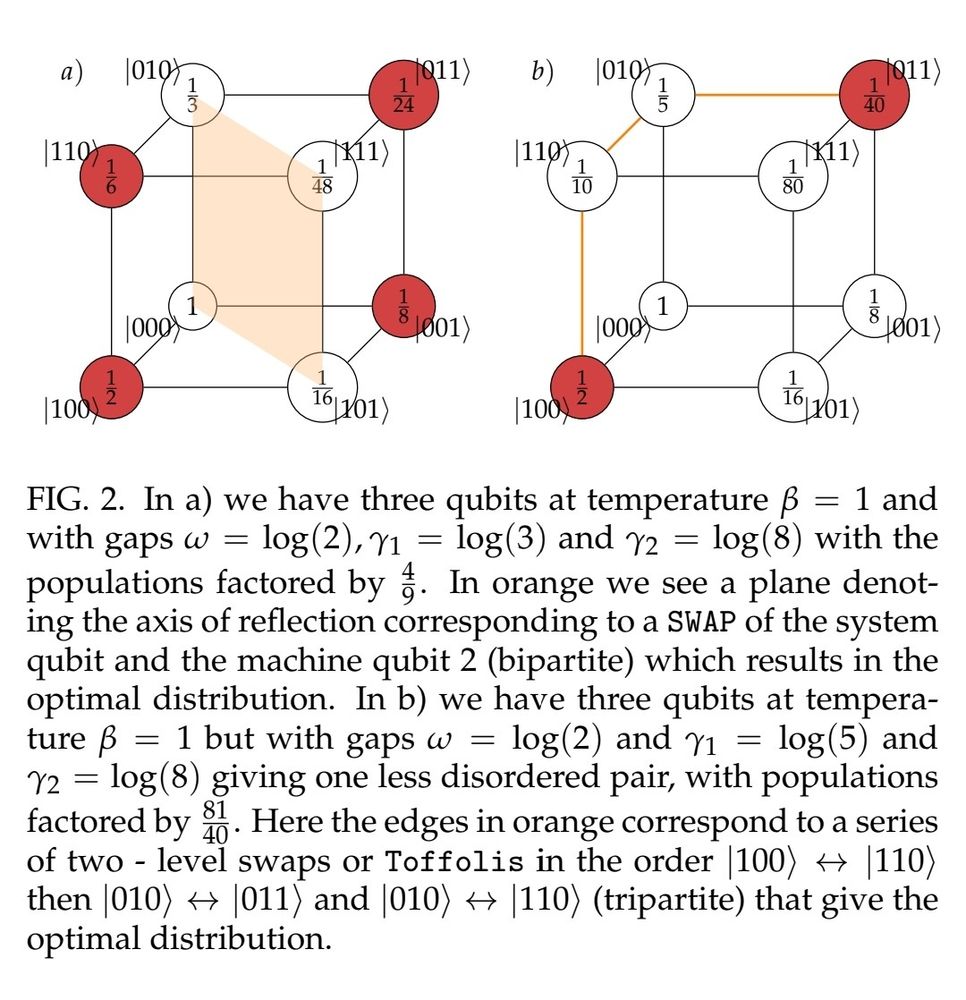
(2/n) When starting to looking into this problem we were interested in understanding "when is cooling hard?" i.e. when is the unitary required to cool something complex.
E.g. in cooling a qubit with two others, when does cooling require a bipartite or tripartite interaction?
13.06.2025 06:27 — 👍 1 🔁 0 💬 1 📌 0
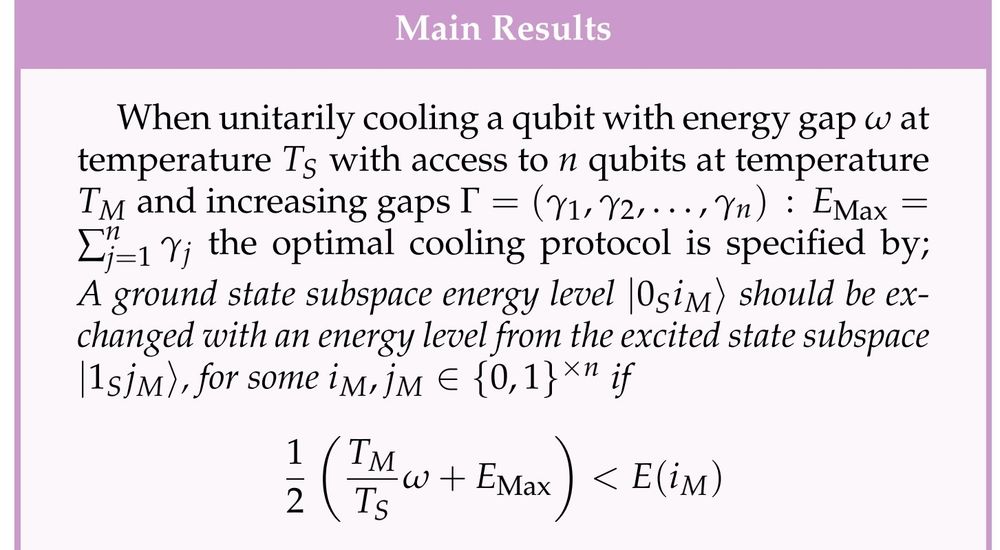
(1/n) Today on the arXiv, we examine the folklore that cooling a quantum system with access to another requires one to order their joint state eigenvalues in decreasing order and find that this sorting is actually dictated by a simple set of inequalities.
scirate.com/arxiv/2506.1...
13.06.2025 06:27 — 👍 14 🔁 2 💬 1 📌 1
It's conceivable to to think of a universe where free energy would take on a different functional form - changing equilibration rates (or whether they equilibriate at all and to what fixed point...) and ultimately the rate at which information propagates through systems and becomes objective.
12.06.2025 07:48 — 👍 2 🔁 0 💬 0 📌 0
Maybe @itsmealeale.bsky.social and @mathsmire.bsky.social would also enjoy weighing in here
11.06.2025 15:36 — 👍 3 🔁 0 💬 1 📌 0
There would be no emergent causal order to the universe without the production of entropy.
The total order on equilibrium states and partial orders on quantum thermal states dictate which state transformations are possible.
Without equilibration nothing hangs out long enough to form structure.
11.06.2025 15:25 — 👍 1 🔁 0 💬 2 📌 0

Totally like not tweeting about this for any specific reasons but the surname Jozsa as in Deutsch-Jozsa is spelled "zs" not "sz" in case like I dunno you like umm put an arxiv posting with this name in the title...
06.06.2025 12:32 — 👍 7 🔁 0 💬 0 📌 1
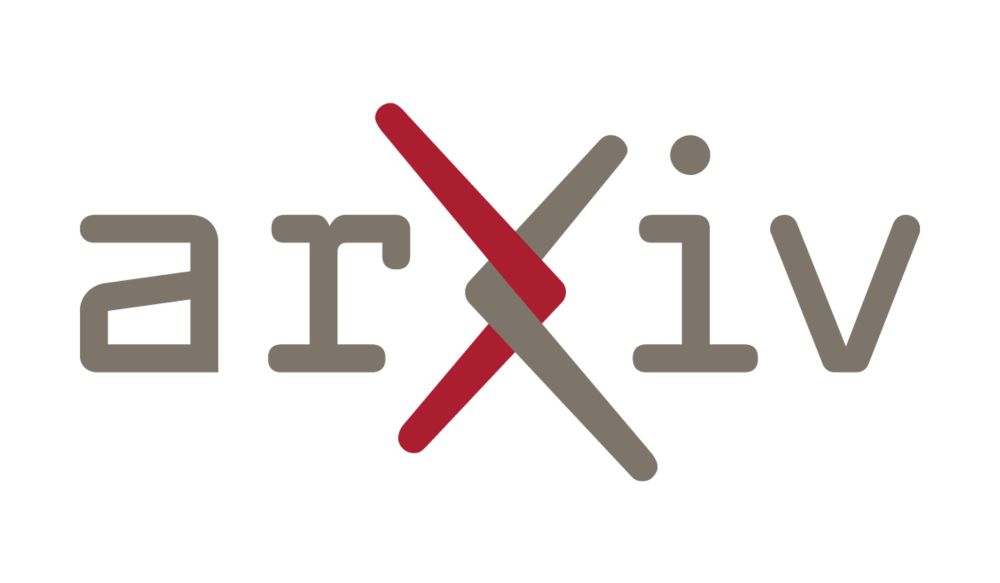
A Universal Constraint on Computational Rates in Physical Systems
Conventional computing has many sources of heat dissipation, but one of these--the Landauer limit--poses a fundamental lower bound of 1 bit of entropy per bit erased. 'Reversible Computing' avoids thi...
It is somewhat strange to see @quantamagazine.bsky.social highlighting a 2022 preprint without any citations
arxiv.org/abs/2208.11196
Not that citations or being published is an indicator of quality - but when the preprint is being used to substantiate the claims of a start-up, it's questionable?
04.06.2025 08:23 — 👍 0 🔁 0 💬 0 📌 0
I think a lot about how Aaron Swartz committed suicide while facing a probably long jail sentence for download some of JSTOR, but no one at Meta is going to face any repercussions for using all of Libgen to train its AI.
02.06.2025 08:48 — 👍 1392 🔁 515 💬 9 📌 6
Deep congratulations to the whole team but especially to Florian on what I'm sure is only his first Nature Physics paper.
I am also super happy to see the Malta - Vienna connection crystallized in such a paper facilitated by @aspects-quantum.bsky.social
02.06.2025 11:19 — 👍 6 🔁 1 💬 0 📌 0
Thanks so much for the shout out and the kind words @felixled.bsky.social
23.05.2025 11:57 — 👍 2 🔁 0 💬 0 📌 0
(7/7) I enjoyed this solo project and found the implications, that you can do some quantum computations without coherences and using thermal states, thought provoking to say the least.
Thanks to all my friends for encouraging me on to give this a shot on my own - wouldn't have done it without you.
23.05.2025 06:29 — 👍 2 🔁 0 💬 0 📌 0
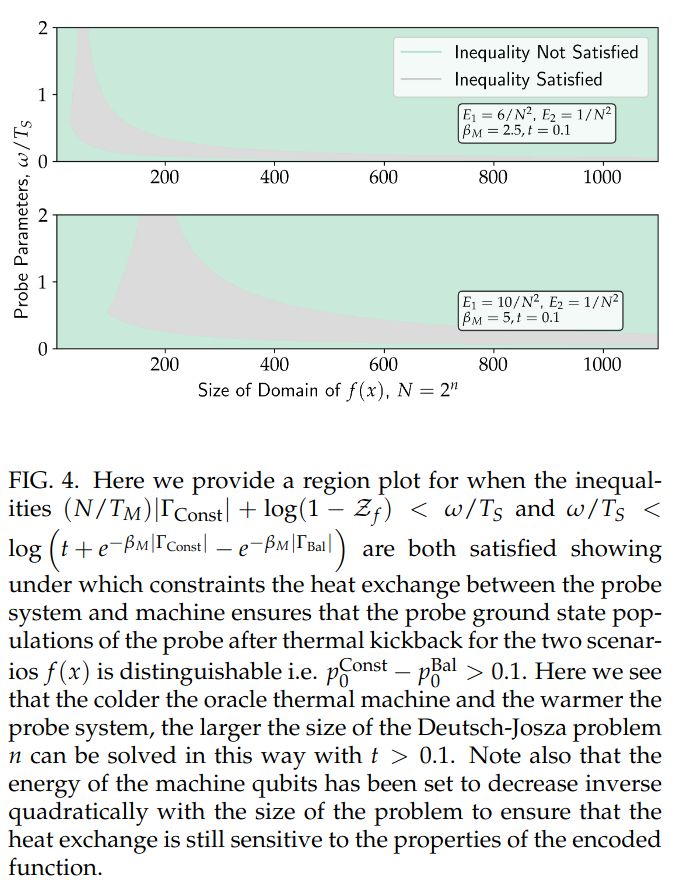
(6/7) Most importantly, since we've encoded our solution into a property of a mixed state - we need samples! Thankfully and surprisingly, if an energetic condition is satisfied, the no. of samples required to solve Deutsch-Josza is independent of the problem size!
23.05.2025 06:29 — 👍 0 🔁 0 💬 1 📌 0
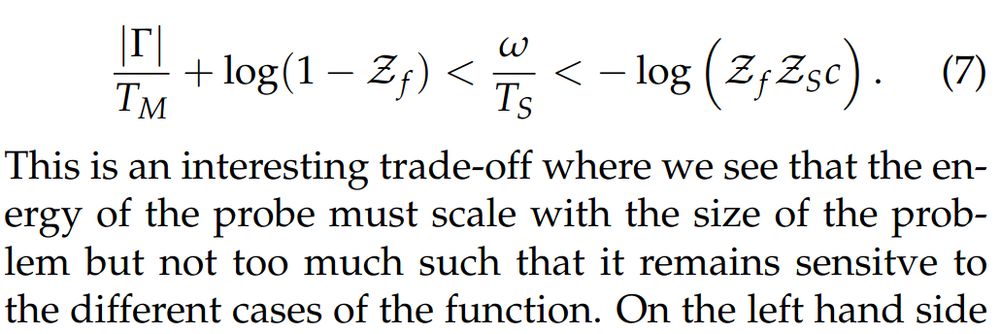

(5/7) Fascinatingly, the probe temperature and energy must scale with the size of the problem to be sensitive to it - but not too much! Or it'll become insensitive to the difference between the different scenarios.
This is my favorite insight, giving a notion of thermo cost for a query.
23.05.2025 06:29 — 👍 0 🔁 0 💬 1 📌 0
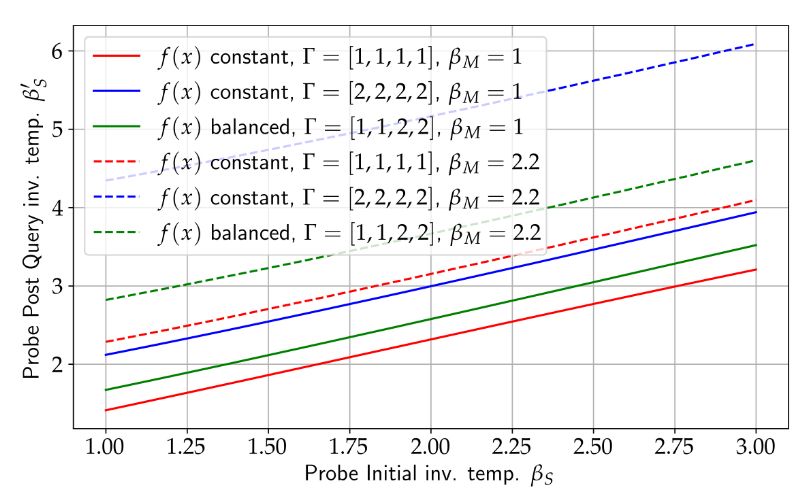
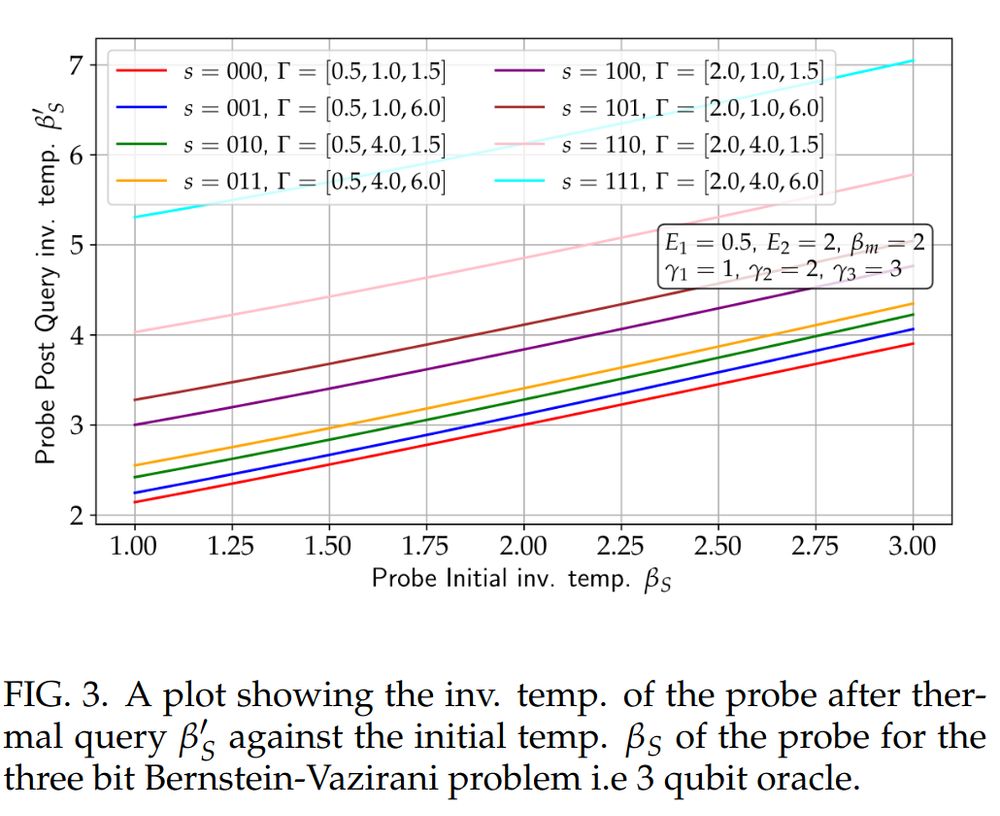
(4/7) The temperature of the probe after query is now sensitive to the property of the function! We examine this for the Deutsch-Josza problem where the oracle uses an exponential no. of thermal qubits for encoding and the Bernstein-Vazirani problem where they can get away with a linear number.
23.05.2025 06:29 — 👍 0 🔁 0 💬 1 📌 0

(3/7) Here we exchange the de-excited probe + all excited machine state with its opposite - excited probe + no excitations in machine.
Because of the oracle's encoding, the all excited state contains information about the sum of the function's output!
23.05.2025 06:29 — 👍 0 🔁 0 💬 1 📌 0

(2/7)Imagine an oracle with access to N thermal qubits whose energy gaps it can change to encode a Boolean function.
Can an agent exchange heat with this oracle's thermal machine using a single qubit and learn properties of the function? Yes, using the famous virtual qubit subspace swap.
23.05.2025 06:29 — 👍 0 🔁 0 💬 1 📌 0
a.k.a. Matt. Physicist, conformal bootstrapper, and #1 Leonid Kantorovich respecter. Idaho → Colorado → Connecticut → Italy. he/him.
Unionize the radiation lab!
University physics lecturer and Associate Dean, Learning. Physics demystifier. Supporter of girls and women in physics. CAP Teaching Medal 2018, 3MNTF 2023. She/her Ph.D.
Principal Researcher @ Microsoft Research.
Cognitive computational neuroscience & AI.
Writer. Nature wanderer.
www.momen-nejad.org
Hear the latest news, meet the people behind the science, and get the background you need to better understand the language of particle physics: https://www.symmetrymagazine.org/
Physicist | Author | Lecturer: Grace in All Simplicity; Gauge Theories of the Strong, Weak, and Electromagnetic Interactions | Supercollider Physics, Higgsologist | https://chrisquigg.com
I had a marvellous time ruining everything.
Scientist. President of @Humanists_UK Lecturer in Genetics @UCL
Genetics, race, eugenics, books, cricket, +–=÷×
@kbjmanagement
adamrutherford.com
Engineer/scientist, Nobel Prize in Chemistry 2018
I love evolution, enzymes, protein engineering, AI
Linus Pauling Professor at Caltech
Professor of Philosophy and Decision Theory, LMU Munich. Co-Director of the Munich Center for Mathematical Philosophy. Account used for academic purposes. Further info at: https://philpeople.org/profiles/christian-list
Neuroscientist: consciousness, perception, and Dreamachines. Author of Being You - A New Science of Consciousness.
Stanford professor (music, CS, design); author of https://artful.design. I make stuff with computers (for humans) to make music.
University of Montpellier - Santa Fe Institute. Working these days on intelligence in biological and artificial systems. Website https://mehochberg.wixsite.com/blog/academia
Bluesky for the blog 4gravitons.com
Emeritus professor of astronomy at the University of Nottingham. Too frequent appearances on YouTube. All my own views.
string theory postdoc at harvard, axion enthusiast
Ezra Klein’s tweets, articles and podcasts on bluesky.
Your Only Source For Professional Dog Ratings
nonprofit: @15outof10.org ❤️🩹
links.weratedogs.com
physicist by training, reporter by trade
tips: katrina.miller@nytimes.com
signal: katrinamiller.04
https://katrinamillerphd.com/



